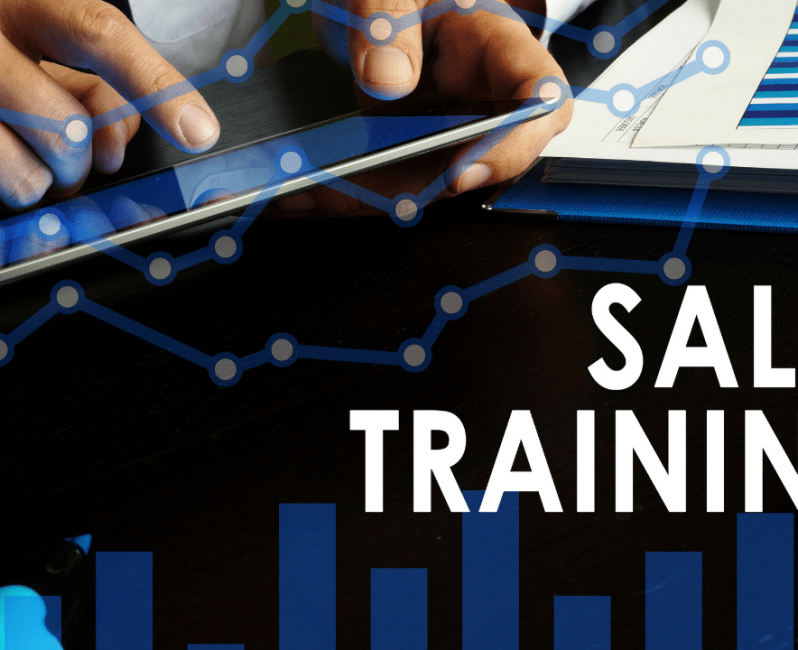I believe there are 3 key topics for sales training that need to be drilled constantly…and I mean in each sales training session.
Whatever your role, be it a sales trainer, manager, vice-president, or CEO, you need to make sure the salespeople you are training can understand and apply what you are teaching quickly, effortlessly…and commercially.
In my experience and having trained hundreds of salespeople across the globe (and am still doing today), these are far more important than the selection of the next CRM or spending hours creating your inbound marketing strategies.
It’s not that you shouldn’t focus on these and other strategies that can really help in your lead generation and sales performance — but if your salespeople are not at the top of their game, then all of your marketing efforts can be seriously impacted.
And, I am a firm believer that salespeople should be able to work independently as their own lead-generation machines and work from lead to deal effortlessly and at the right level.
For me, it’s the only way to have full control over the entire process.
Old School Selling Is Dead
Not so fast…
Here is an article from UK training company Growth Engineering talking about some of the challenges faced in sales training and I agree with the sentiment of this article, except the part about keeping the sales team informed.
There is a misconception that “old school” sales training techniques and methods are long gone and sales training has moved with the times.
But until we move away from the global drought of good, talented, and successful “real” salespeople, I’m not convinced.
Having been around tech all of my working life, I fully understand the value of it, especially when it comes down to sales and selling…but for me, you have to be extremely conscious of dealing with the “last mile” and that means getting your deals over the line.
It requires the human touch and the best way to secure a deal is to make sure you start as you mean to go on.
Speak to the key decision-makers from the start and they are far less likely to be spending precious time moving through your automated sales funnel and answering a ton of questions that you, as a company, should have answers to in the first place.
That means the people who sign the checks and those people are at C-Level these days!
You may get stakeholders below, who control a portion of the budget, which may be enough for your deal, but what if that deal suddenly has to go up for approval?
Now you are into what I term “third-party selling” and you have much less control.
The 3 key sales topics I am going to talk about are designed to keep your salespeople sharp and engaged at the right level and to give you, less sleepless nights and a consistent, high-performance sales team.
I go a bit more into the philosophy about my sales training ideas in the related article below and in this one, I am going to cover specifics.
Related: 5 Sales training ideas to transform your sales team
Topics for Sales Training #1

There is nothing worse than watching a salesperson struggle through a pitch, using a canned speech, and looking very uncomfortable.
I should know because, in my early sales career, this is exactly what I had to do.
When I started my sales journey selling home improvements door-to-door, I was trained personally by the regional manager, who took me through a fast-paced, rapid sales pitch designed simply to get an appointment for a salesperson to provide a quote.
And in those days, the salesperson was likely to spend an entire evening in the customer’s home until they got a deal…or were thrown out, which most were.
Entering The Commercial World
I entered the commercial world of selling believing that I would become more “professional” because now I would be dealing in the business-to-business world.
I was dead wrong.
The speeches were just as canned and the presentations were cookie-cutter with the usual “how great a company we are” and why we are better than the competition.
Over the years, I progressed from this to selling into the boardrooms of some of the worlds leading technology companies and completing multi-million dollar deals — as I moved up the value chain in terms of people, I realized that “selling” was futile.
I had to have a huge understanding of the industry and the individual customer, a great deal of commercial awareness and I realized that throwing all of the traditional sales techniques and methodologies out of the window, was totlally liberating.
And more importantly, I could be myself…have an opinion…I could talk to people about things outside of business and build real relationships, many of which I hold to this day.
Train Your Salespeople To Be Natural
How do you train someone to be themselves, you may ask?
It’s easy because in the world of selling most salespeople have trained themselves to be someone else!
They take on the persona of their sales hero…of the person, they “think” they need to be and trying desperately to avoid who they really are!
The real unique selling point in any sales situation is ..the salesperson.
And customers are desperate to see the “real” salesperson which will actually allow them to drop their own barriers (yes, customers do the same) and that makes for a much easier sales process and more meaningful discussions.
The training part, by the way, is mostly all about “unlearning.”
Training Tips
I’ve had great success by taking existing or raw salespeople through the following process:
I ask them to prepare a short presentation on something they are passionate about — it could be sport, music, cooking, or anything.
The presentation should last around 10 minutes and then the team will ask questions.
This simple exercise achieves a great deal and recently I put it to the test with a group I am working with and we had subjects ranging from making healthy smoothies to crypto investing and stock trading.
What you will notice is the passion they demonstrate and that is because they have a genuine interest in the subject and the relevant knowledge…which leads to confidence and audience engagement.
They answer questions without hesitation; they don’t agonize over which words to use, or the structure of the presentation.
It flows naturally.
All you have to do as a trainer is to take this material and swap the information to your own company, products, and/or services.
You are now training from a good foundation and for the salespeople, they know they can be confident as long as they have the knowledge…and the passion.
Topics For sales Training #2

This topic is really the “secret” if there was ever one — salespeople operate in a commercial world and so few of them are commercially aware enough to survive in it!
Make sure your team is commercially aware and that means to forget about “selling” your products and services and focus on the commercial implications they have with regard to your customers.
When I talk about commercial awareness, I am talking about how businesses operate and generate revenues…at least in the first instance, but there is also the element of risk along with the economic and geopolitical factors.
Your customers, just like you, are operating in a volatile and uncertain economy and you have to be aware of the risk factors to the global industry — risks these days have a nasty habit of becoming real and you must be prepared for them.
A good starting point would be to look at the global situation of the industry you operate in — back in the late 90s, my company was booming thanks to the growth surge in the tech sector.
But I was oblivious to the underlying issues, as were many others, that were looming.
We were heading for a huge crash that would see many companies perish and it took all of my resolves to survive and come out on the other side.
Teach Your Sales Team About The Business Of Your Customers
And go deep!
The more your salespeople understand how your customers operate, the better they can serve them.
Depending on the size of your customers, look at their performance…how have their shares performed recently, how are they performing against their closest competitors, what are the most like risk factors to the business, how agile is their business model, what do their customers think about them?
And so on.
Or you could spend your time learning the latest closing techniques.
I know where I got the best return on my time and investment from!
By going deep into your customers, you are training your salespeople to research and also to think before they start to pitch.
Make Sure They Understand How To Align Your Services
Now move away from the standard features, advantages, and benefits statements and look to understand how you really benefit your customers — look at the key outcomes relating to what you do and how they benefit:
- The executive leadership team.
- The operational management of the company.
- The people who perform specific business functions.
Notice that I am focusing on the benefits to the people because you will be dealing with people and your job is to make their life easier.
If you are a tech company that is looking to replace people with an automated solution, then you need to pick the business layer that you can have those discussions with.
But all discussions should be started strategically and that is what I am going to talk about next.
Typically I would devote the majority of the sales training sessions to this area, as there is so much to learn, and think of it as giving your salespeople their own, customized internal MBA.
Be warned…you will not necessarily see immediate results because the knowledge takes time to embed and you must also test and refresh it regularly.
The key here is consistent hard work and a variety of knowledge that doesn’t have to be limited to your industry and in fact, you may get better results by stepping your team out of it.
It’s amazing how creative people can be when you put them into diverse situations.
Topics For Sales Training #3

Now we come to the final part and that is to make sure the effort you have put into training your team is not wasted.
It is absolutely essential to engage with your customers at the right level — the executive leadership level.
Anything less and you wasting your time.
Before you come back at me and explain that you are already doing a ton of business without talking to this layer, I will ask you to look at the following and give honest answers:
- Are your deals done on a “company to company” basis or are they in the hands of individual salespeople with individual relationships?
- Have you lost business because key contacts or key salespeople have moved on?
- Do you often think you could do bigger and more profitable deals?
- Do you have a “customer map” of each and every key contact and influencer in the business?
- Are you frustrated with the performance of your sales team overall in terms of sales, margins, and risk factors?
Is Your Answer “Yes?”
If you have answered “yes” to any of these questions, then you need to look specifically at how you are engaging with your customers and making sure you address the following:
- You have the right strategy.
- You understand fully the current and future problems, challenges, and risk factors that apply specifically to your industry and individual customers.
- Your products and/or services are specifically aligned to the above.
- You have the right team in place to deliver them.
- You are focussing on the right metrics.
- You have the right technology to support the team.
Once you take a cold, hard look at what you are really trying to achieve and through a deep understanding of your industry and customers, you will be in a position to define the right strategy and execute against it.
You will also be aware of the current and future risks to your industry as a whole and how they could filter down to each of your customers and the specific impact.
But more importantly, you will have fewer sleepless nights and a consistently high-performing sales team.
This is achieved by two specific things:
- Deep research.
- Engaging with your customers at the right level.
I’ve covered this in much more detail in this article:
Sales training: The ultimate guide to help you become a key influencer.
Please take a look!
Conclusion
So much time is wasted on unnecessary sales training — objection handling, closing techniques, and preparing canned speeches and presentations.
Yes, I really do think that objection handling and closing techniques are a waste of time and that is because customers have wised up and they are no longer vulnerable (if they ever really were) to the tactics that often backed them into a corner and feeling that they have to take the deal to get out of it!
Why train your salespeople to handle objections that should never arise in the first place?
Real selling is about having an in-depth understanding of your industry and individual customers that you are working with and targeting — it’s about being proactive and answering questions before they arise. It’s about working in anticipation.
Closing techniques need to be employed because those questions have not been addressed, or some other underlying issue such as the length of time your company has been in business, causing doubt in your customer’s mind.
Again, something that can easily be addressed from the start.
The right deals, with the right customers, with the right knowledge and understanding, will naturally complete…or they won’t.
But you will know exactly why!
Neil Franklin

Entrepreneurship Sales Training Topics For Sales Training
Last modified: July 15, 2021






